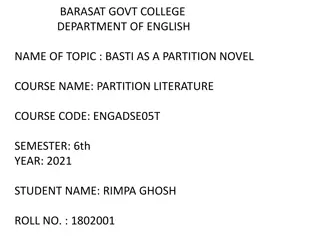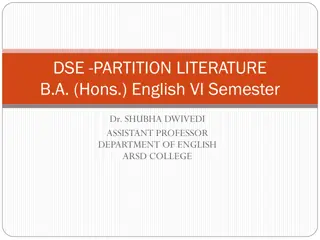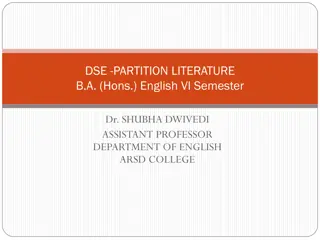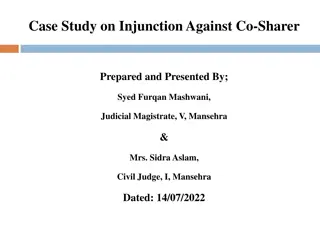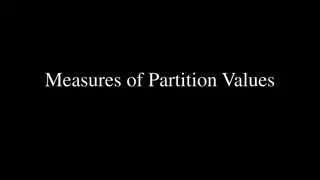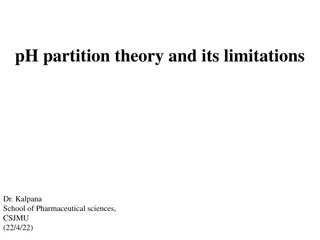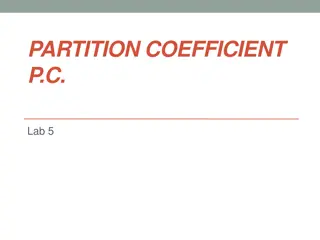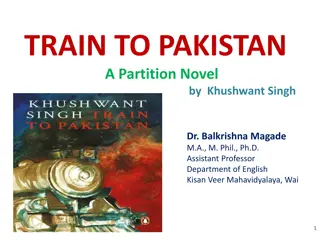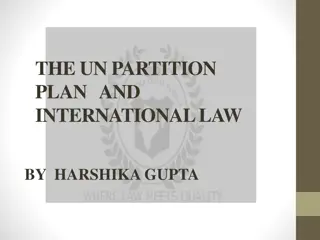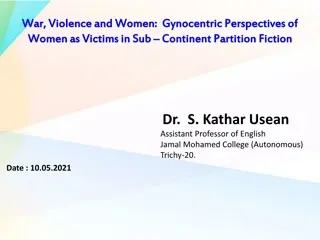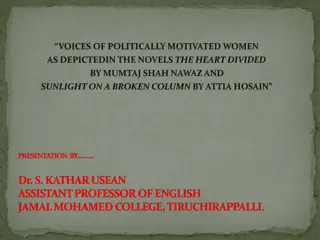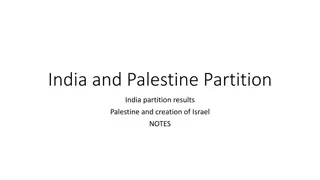Ginzburg Landau phenomenological Theory
The Ginzburg-Landau phenomenological theory explains superconductivity and superfluidity as distinct thermodynamic phases. It focuses on phase transitions characterized by singularities in specific heat at the transition temperature. Derived from BCS theory, it quantifies condensation energy, emphas
1 views • 38 slides
Crystal Field Theory in Transition Metal Complexes
Crystal Field Theory (CFT) explains the colors and magnetic properties of transition metal complexes. It focuses on the energy changes in d-orbitals of metal ions caused by surrounding ligands. This theory, developed in 1929, provides insights into the bonding interactions in complex compounds. The
10 views • 44 slides
Elevate Your Space Exploring Stunning Gypsum Ceiling Designs and Partition Walls
Are you looking to add a touch of elegance and sophistication to your space? Look no further than gypsum ceiling designs and partition walls. These versatile and stylish elements can completely transform the look and feel of any room, whether it's a home, office, or commercial space.
6 views • 6 slides
Understanding Social Learning Theory and the Power of Example
Social Learning Theory, introduced by Bandura, emphasizes learning through observation and modeling. It explores how individuals acquire behavioral dispositions, trial-and-error experiences, and the impact of stimuli in the environment. The theory focuses on the importance of attention, retention, a
1 views • 17 slides
Exploring Partition and Its Effects Through "Basti": A Unique Perspective
Basti," a novel that delves into the aftermath of the 1947 India-Pakistan partition, presents a unique narrative by highlighting two partitions based on religion and language. Author Intizar Husain sheds light on the profound consequences of these divisions, depicting the deep-seated impact on indiv
1 views • 8 slides
Evolution of Mathematical Theories and Proof Systems
Development of mathematical theories such as model theory, proof theory, set theory, recursion theory, and computational complexity is discussed, starting from historical perspectives with Dedekind and Peano to Godel's theorems, recursion theory's golden age in the 1930s, and advancements in proof t
1 views • 29 slides
Introduction to Organizational Behavior: Management Theories and Practices
Explore the evolution of organizational behavior from early management theories to contemporary practices. Understand the historical foundations and relevance of management theory in shaping workplace dynamics. Delve into key concepts like Scientific Management, Administrative Management, Bureaucrat
1 views • 28 slides
Impact of Partition: Saadat Hasan Manto's Literary Contributions
Saadat Hasan Manto, a prominent figure in South Asian literature, deeply explored the human tragedy and trauma caused by the Partition of India in his writings. Despite facing personal challenges, Manto's works like "Toba Tek Singh" continue to be recognized globally for their poignant portrayal of
0 views • 10 slides
Theories on the Origin of State: Divine, Force, Patriarchal, and More
Various theories such as Divine Origin, Force Theory, Patriarchal Theory, and others explain the origin of the state. Divine theories attribute state creation to God, while Force Theory emphasizes the strong subjugating the weak to establish authority. Each theory offers unique perspectives on the h
1 views • 24 slides
Understanding Forgetting: Theories and Influence on Memory Recall
Forgetting is a complex phenomenon influenced by theories such as Decay Theory, Interference Theory, and Motivated Forgetting. The Ebbinghaus forgetting curve highlights how memories fade over time. Decay Theory suggests memories decay over time, while Interference Theory explains how old and new me
0 views • 25 slides
Psychological Theories of Criminality: Understanding the Roots
Psychological theories of criminality delve into the association between intelligence, personality, learning, and criminal behavior. Major theories include Psychodynamic Theory by Freud, Behavioral Theory by Bandura, and Cognitive Theory by Kohlberg. These theories explore how unconscious mental pro
1 views • 20 slides
Austin's Theory of Law by Rinkey Sharma: An Overview
Austin's Theory of Law, presented by Rinkey Sharma, delves into the Imperative Theory of Law as proposed by Austin, known as the father of English jurisprudence. It explores General and Particular Jurisprudence, Austin's definition of law, and the elements of positive law, emphasizing the concepts o
0 views • 11 slides
Exploration of Partition Literature in Indian English Fiction
Political partition in India led to a significant literary genre known as Partition Literature. This genre explores the socio-historical impact of the partition era through novels and short stories, offering alternative histories and personal perspectives on this defining event. Notable works by aut
0 views • 14 slides
Legal Analysis: Injunction Against Co-Sharer in Property Disputes
An injunction is a legal remedy where a party is ordered to refrain from or do a specific act. In property disputes involving co-sharers, the question arises whether injunctive relief can be granted without partition. Two schools of thought exist on this matter, with the first school suggesting that
0 views • 24 slides
Understanding the Theory of Firms: Neoclassical vs. Modern Approaches
The theory of firms is explored through the Neoclassical and Modern perspectives. Neoclassical theory focuses on profit maximization, while Modern theory delves into managerial, principal-agent, and transaction cost theories. The discussion covers criticisms of Neoclassical theory and the essential
1 views • 79 slides
Understanding Physicochemical Properties of Drugs
The physicochemical properties of drugs play a crucial role in their pharmacological effects. These properties include physical and chemical characteristics that influence interactions with biomolecules. Solubility, partition coefficient, and dissociation constant are key factors affecting drug beha
1 views • 46 slides
Theories of Causation in Psychological and Social Sciences
Overview of theories of causation categorized into psychological, social psychological, and sociological perspectives. Psychological theories focus on instinctive, biological, and psychological qualities of abusers, including Attachment Theory, Psychodynamic Theory, Social Learning Theory, and Situa
0 views • 15 slides
Understanding Political Theory through a Contextual Approach
Exploring G.H. Sabine's perspective on political theory through a contextual approach, emphasizing the importance of historical context and societal influences. Sabine argues that while political theory evolves with its contemporary politics, it should be analyzed within its specific time and social
0 views • 9 slides
Understanding Ion-Pair Chromatography (IPC): Theory and Applications
Ion-Pair Chromatography (IPC) involves adding ionic surfactants to a reversed-phase Chromatography system to affect retention and selectivity of ionic compounds. Developed by Dr. Gordon Schill, IPC is crucial for resolving hydrophilic samples and controlling selectivity in separations. The theory in
6 views • 18 slides
Equivalence Relations and Partition Induced Relations
The concept of equivalence relations and partition-induced relations on sets are explored. Equivalence relations satisfy reflexivity, symmetry, and transitivity, making them important in various mathematical contexts. The relation induced by a partition of a set is shown to be an equivalence relatio
0 views • 24 slides
Evolution of Light Theory: From Wave Theory to Quantum Theory
At the turn of the century, the discovery of the photoelectric effect challenged the wave theory of light, leading to the development of the quantum theory by Max Planck and Albert Einstein. This new theory introduced the concept of discrete energy units known as quanta, bridging the gap between wav
1 views • 62 slides
Understanding Partition Values in Statistics
Partition values such as quartiles, deciles, and percentiles play a crucial role in dividing a dataset into various segments for analysis. Quartiles split the data into 4 equal parts, deciles into 10 parts, and percentiles into 100 parts. These values help in understanding the distribution of data a
0 views • 7 slides
Understanding Biopharmaceutics: pH Partition Theory and Drug Absorption
Biopharmaceutics explores how drug properties and administration methods impact drug absorption. Factors affecting oral absorption include membrane physiology and drug partitioning based on pH levels. The pH partition theory, explained by Brodie et al., highlights the role of drug lipid solubility a
0 views • 9 slides
Understanding Partition Coefficient in Pharmaceuticals
Partition coefficient (P.C.) is crucial in pharmaceuticals for various reasons such as preserving oil/water systems, drug distribution in the body, extraction processes, and dosage form formulations. It involves the distribution of a solute between two immiscible liquids based on equilibrium express
0 views • 10 slides
Khushwant Singh: Life and Works - Train to Pakistan Novel Summary
Khushwant Singh, a renowned writer and columnist, was born in 1915 in Haladi (now in Pakistan) and educated in Delhi and Lahore. He authored several books, including "Train to Pakistan," a novel on the partition. The novel, published in 1956, depicts the impact of the partition on Mano Majra, a fict
0 views • 33 slides
Dp-branes, NS5-branes, U-duality, and M-Theory Overview
Overview of Dp-branes, NS5-branes, and U-duality derived from nonabelian (2,0) theory with Lie 3-algebra. Introduction to M-theory, including M2-branes and M5-branes in the strong coupling limit. Discussion on BLG theory, Lorentzian Lie 3-algebra, and the ABJM theory for M2-branes.
1 views • 32 slides
Understanding Numerical Integration in Density Functional Theory (DFT)
The application of numerical integration techniques in Density Functional Theory (DFT) is crucial for solving the Eigenvalue Problem and evaluating energy functionals. This involves partitioning integrals, approximating integrals at atomic centers, defining partition functions, and ensuring cell fun
0 views • 15 slides
Understanding Time-Independent Perturbation Theory in Quantum Mechanics
Perturbation theory is a powerful tool in solving complex physical and mathematical problems approximately by adjusting solutions from a related problem with known solutions. This theory allows for more accurate approximate solutions by treating the difference as a small perturbation. An example inv
0 views • 19 slides
Ethical Theories: Divine Command vs. Virtue Theory Explained
Divine Command Theory asserts that morality is derived from God's commands, contrasting with Virtue Theory which focuses on developing moral virtues to achieve human flourishing and excellence. Divine Command Theory relies on religious texts, while Virtue Theory emphasizes the cultivation of virtues
0 views • 24 slides
The UN Partition Plan and International Law in Relation to Resolution 181 by Harshika Gupta
The United Nations Resolution 181, passed in 1947, recommended the partition of Palestine into Arab and Jewish states. This plan, which led to conflict and violence, was considered a legal basis for the establishment of Israel. The resolution addressed the competing claims of Jews and Arabs over Bri
1 views • 15 slides
Understanding Fermi Liquid Theory in Interacting Fermion Systems
Fermi liquid theory, also known as Landau-Fermi liquid theory, is a theoretical model that describes the normal state of metals at low temperatures. Introduced by Landau and further developed by Abrikosov and Khalatnikov, this theory explains the similarities and differences between interacting ferm
0 views • 23 slides
Computational Learning Theory: An Overview
Computational Learning Theory explores inductive learning algorithms that generate hypotheses from training sets, emphasizing the uncertainty of generalization. The theory introduces probabilities to measure correctness and certainty, addressing challenges in learning hidden concepts. Through exampl
0 views • 43 slides
Automata Theory and Theory of Computation Overview
This course overview covers concepts in automata theory and theory of computation, including formal language classes, grammars, recognizers, theorems in automata theory, decidability, and intractability of computational problems. The Chomsky hierarchy, interplay between computing components, modern-
0 views • 42 slides
Theories of Interest in Microeconomics II
Explore various theories of interest in economics, including the Classical Theory, Liquidity Preference Theory by Keynes, Productivity Theory, Abstinence Theory, Time-Preference Theory, Fisher's Time Preference Theory, and the Loanable Fund Theory. These theories offer different perspectives on the
0 views • 6 slides
Exploring the Evolution of Atomic Theory
Delve into the historical journey of atomic theory starting from Democritus and Aristotle's views to modern advancements proving some aspects of Dalton's theory incorrect. Learn about key laws and theories such as the Particle Theory of Matter, Dalton's Atomic Theory, and JJ Thomson's discoveries, s
0 views • 30 slides
War, Violence, and Women in Subcontinent Partition Fiction: A Literary Analysis
This research work delves into the portrayal of gynocentric perspectives focusing on women as victims in the works of female novelists from South Asia regarding the India-Pakistan Partition and the Bangladesh War. The study examines six novels by authors such as Jyotirmoyee Devi, Attia Hosain, Mumta
0 views • 34 slides
Women's Perspectives on Pre-Independence India and Partition
Novels by authors such as Mumtaj Shah Nawaz depict the conditions of women in politically charged pre-independence India and during the partition period. These narratives explore how women were victimized, but also highlight the empowerment and active involvement of women in politics, as seen in pro
0 views • 7 slides
Gas Chromatography: Introduction, Theory, and Instrumentation
Gas chromatography is a powerful analytical technique used to separate and analyze volatile substances. Originating in 1905, it involves the partition between a gas and a solid or liquid stationary phase. The theory revolves around retention time and the tentative identification of unknown compounds
0 views • 10 slides
Macromechanical Analysis of Lamina and Tsai-Hill Failure Theory Overview
The Tsai-Hill failure theory is based on the strengths of a unidirectional lamina, incorporating longitudinal and transverse tensile and compressive strengths, as well as in-plane shear strength. This theory, derived from the distortion energy theory, provides criteria for determining lamina failure
0 views • 15 slides
Impact of Partition on India and Palestine
The partition of India and Palestine had significant consequences, including mass movements of people, chaos, riots, and violence. The partition resulted in the creation of India and Pakistan, leading to the migration of millions of Muslims to West Punjab in Pakistan and Hindus/Sikhs to East Punjab
0 views • 12 slides




